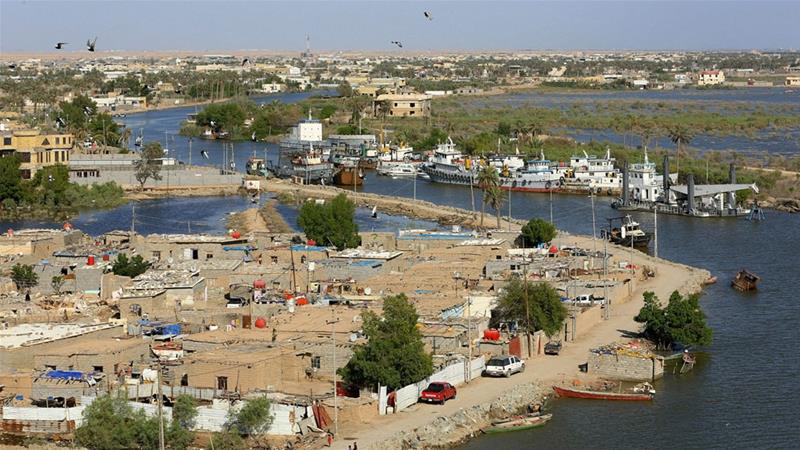One year on from Basra's health crisis, which saw 118,000 people hospitalised due to stomach pains and skin rashes blamed on poor water quality, the Iraqi government has done little to ensure safe drinking water for the southern region of four million people, according to Human Rights Watch (HRW).
The international rights group on Monday outlined the multiple, complex factors that led to last summer's crisis in a new report, titled Basra is Thirsty: Iraq's Failure to Manage the Water Crisis.
The primary water source for Basra is the Shatt al-Arab river and its freshwater canals, though for decades water infrastructure has been neglected and laws against dumping waste into the river have not been enforced, HRW said.
Some hospitals received up to 3,000 patients a day, suffering from rashes, abdominal pain, vomiting and diarrhoea, all related to the poor quality of drinking water, it said.
HRW senior Iraq researcher Belkis Wille told Al Jazeera it was "deeply irresponsible" that the Iraqi Government has not taken measures in the past year to ensure a similar health crisis does not happen again in the future.
"They've essentially sat on their hands for the last year ... It's shocking nothing really has been done," Wille said.
Sewage Dumped
The report's authors conducted dozens of interviews with Basra residents, government officials and also analysed satellite imagery.
Citing authorities, the report stated that around 40 percent of Basra's sewage was currently being dumped directly into the Shatt al-Arab.
Water treatment plants in Basra are not effectively removing contaminants from human, animal, household and industrial waste, while the amount of chlorine being added during treatment was insufficient, according to HRW.
It added that an estimated 338,400 Basra residents who live in informal housing across the governorate are excluded from the government's water and sanitation network, which in turn pressures them to tap illegally into water pipes running under their homes, taking advantage of a piping network requiring much-needed repair.
Satellite imagery sourced by HRW also revealed oil spills in the Shatt al-Arab, which were not disclosed by authorities.
Highly-intensive agriculture upstream of Basra's waterway, coupled with climate change, increasing water evaporation and low rainfall last year, has resulted in high salinity in drinking water, the report said.
Iraqi Ministry of Health Director Saif al-Bader told Al Jazeera the ministry monitors water quality "regularly".
"We are monitoring every detail ... with weekly meetings," al-Bader said.
He said he could not comment on projects for access to safe water or on how the Ministry of Health has adjusted its strategy to protect Basra residents.
Economic Burden
The Norwegian Refugee Council found in 2018 that every household in Basra spends a minimum of $60 each month on purchasing filtered water, and a further $60 to $80 a month on water for personal hygiene, laundry and other non-potable uses.
Abd al-Razzak from Abu al-Khasib in southern Basra told Al Jazeera that tap water is too salty for his family to drink.
"The water is not drinkable, so we buy water for cooking and drinking," Abd al-Razzak said.
"Only for showering and washing we use tap water."
HRW's Wille stressed the Iraqi government's obligation under international law to provide safe access to water, sanitation and health.
"If these people can't afford to pay for it, they need to have access to that water regardless," Wille said.
The agriculture sector, which is the largest source of employment in Basra, has also been impacted by the poor water quality.
HRW states that approximately 87 percent of agricultural land has been lost due to seawater intrusion and the salinity of the water being used for irrigation.
Al-Razzak told Al Jazeera his family lost thousands of dollars in last year's date season as the majority of their trees died.
Government Corruption
Residents, HRW and government ministers said corruption was partially to blame for the water crisis in Basra.
Iraq Ministry of Agriculture spokesperson, Hamid al-Nayef, told Al Jazeera that there is funding available to build infrastructures such as desalination plants, new pipelines and dams, but the management of these projects is the problem.
"The large amount of corruption is what brought the province to the current state," al-Nayef said.
Al-Razzak said unqualified people are hired in government positions who can't manage Basra's situation.
"They said they would fix the situation and build new stations to filter the water but nothing has been fixed," he said.
Wille at HRW said as far as the group could tell, people are not being sanctioned or penalised for dumping waste in the riverway.
"The comments we got from government and non-government ... were people were paying bribes in order to sneak by and not uphold regulations," Wille said.
Source


 RSS Feed
RSS Feed